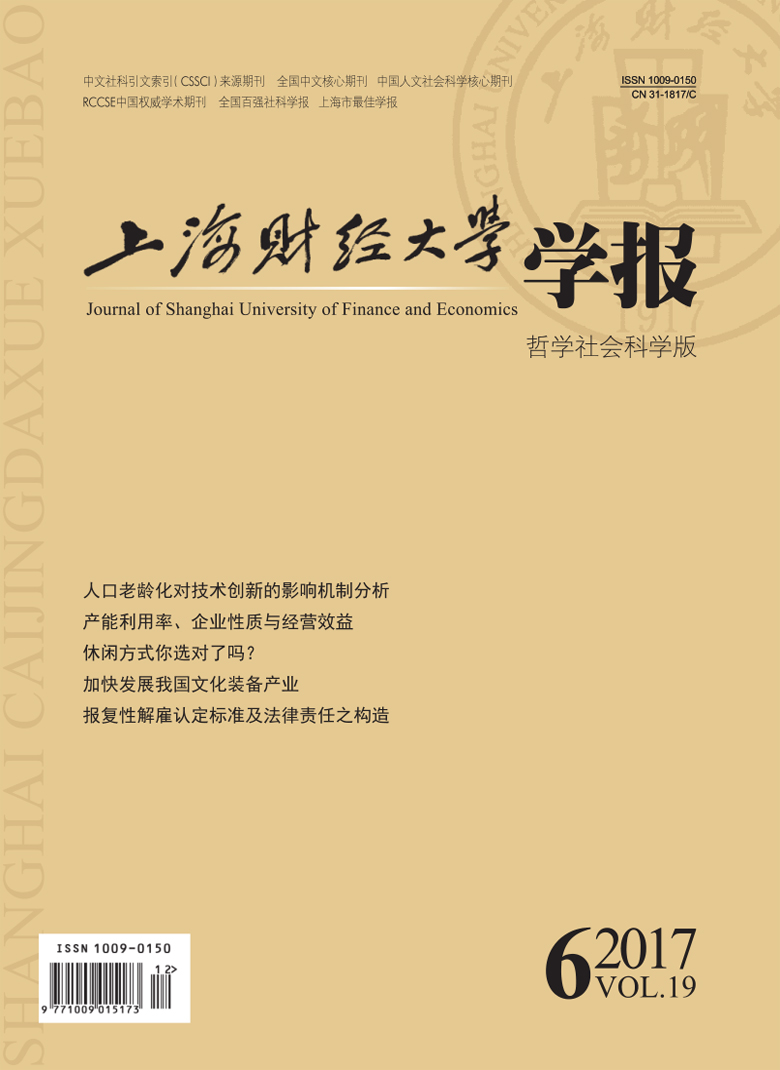年龄歧视对员工创新的负面影响已经成为企业不可忽视的重要问题。在我国老龄化进程不断加快和创新发展需求不断强化的背景下,研究年龄歧视对员工创新行为的负面影响以及缓解这种负面影响的路径,既有助于创新型社会的构建,也有利于老龄化社会的积极应对。文章基于现代歧视理论和认知情感的个性系统理论,实证检验不同年龄群体的年龄歧视感知对创新行为和退缩行为的影响过程。研究发现:(1)我国存在明显的年龄歧视问题,组织中老龄员工的年龄歧视感知最严重,年轻员工次之。(2)年龄歧视对员工的创新行为和退缩行为具有直接的消极影响。与年轻员工相比,年龄歧视对老龄员工创新行为和退缩行为的负面影响更大。(3)组织支持和组织承诺的提升在缓解年龄歧视对员工创新行为和退缩行为的消极影响方面具有明显效果。因此,政府应从制度层面消除年龄歧视,引导企业通过提升员工的组织支持和组织承诺缓解年龄歧视对员工创新的消极影响,以激发不同年龄层次的员工创新行为。
退缩还是创新:受年龄歧视影响的员工行为解析
摘要
参考文献
2 颜静, 樊耘, 张旭. 顺从型和挑战型组织公民行为: 基于情感体验与理性认知双路径[J]. 管理工程学报, 2016, (3).
4 Allen N J, Meyer J P. The measurement and antecedents of affective, continuance and normative commitment to the organization[J]. Journal of occupational and organizational psychology, 1990, 63(1): 1–18. DOI:10.1111/joop.1990.63.issue-1
5 Amabile T M, Gryskiewicz N D. The creative environment scales: Work environment inventory[J]. Creativity Research Journal, 1989, 2(4): 231–253. DOI:10.1080/10400418909534321
7 Bal A C, Reiss A E B, Rudolph C W, et al. Examining positive and negative perceptions of older workers: A meta-analysis[J]. Journals of Gerontology, 2011, 66(6): 687–698.
8 Banai M, Reisel W D, Probst T M. A managerial and personal control model: Predictions of work alienation and organizational commitment in Hungary[J]. Journal of International Management, 2004, 10(3): 375–392. DOI:10.1016/j.intman.2004.05.002
9 Bayl-Smith P H, Griffin B. Age discrimination in the workplace: Identifying as a late-career worker and its relationship with engagement and intended retirement age[J]. Journal of Applied Social Psychology, 2014, 44(9): 588–599. DOI:10.1111/jasp.2014.44.issue-9
10 Bertolino M, Truxillo D, Fraccaroli F. Age effects on perceived personality and job performance[J]. Journal of Managerial Psychology, 2013, 28(7/8): 867–885. DOI:10.1108/JMP-07-2013-0222
11 Damman M, Henkens K, Kalmijn M. Late-career work disengagement: The role of proximity to retirement and career experiences[J]. Journals of Gerontology Series B: Psychological Sciences and Social Sciences, 2013, 68(3): 455–463. DOI:10.1093/geronb/gbt001
12 Ducharme L J, Martin J K. Unrewarding work, coworker support, and job satisfaction[J]. Work and Occupations, 2000, 27(2): 223–243. DOI:10.1177/0730888400027002005
13 Duncan C, Loretto W. Never the right age? Gender and age-based discrimination in employment[J]. Gender Work & Org, 2004, 11(1): 95–115.
14 Eisenberger M, Hornedo J, Silva H, et al. Carboplatin (NSC-241-240): An active platinum analog for the treatment of squamous-cell carcinoma of the head and neck[J]. Journal of Clinical Oncology Official Journal of the American Society of Clinical Oncology, 1986, 4(10): 1506–1509. DOI:10.1200/JCO.1986.4.10.1506
15 Finkelstein L M, Burke M J, Raju M S. Age discrimination in simulated employment contexts: An integrative analysis[J]. Journal of Applied Psychology, 1995, 80(6): 652–663. DOI:10.1037/0021-9010.80.6.652
16 Finkelstein L M, Ryan K M, King E B. What do the young (old) people think of me? Content and accuracy of age-based metastereotypes[J]. European Journal of Work and Organizational Psychology, 2013, 22(6): 633–657. DOI:10.1080/1359432X.2012.673279
17 Fisher B J, Specht D K. Successful aging and creativity in later life[J]. Journal of Aging Studies, 1999, 13(4): 457–472. DOI:10.1016/S0890-4065(99)00021-3
18 Garstka T A, Schmitt M T, Branscombe N R, et al. How young and older adults differ in their responses to perceived age discrimination[J]. Psychology and aging, 2004, 19(2): 326–335. DOI:10.1037/0882-7974.19.2.326
19 Hanisch K A, Hulin C L. Job attitudes and organizational withdrawal: An examination of retirement and other voluntary withdrawal behaviors.[J]. Journal of Vocational Behavior, 1990, 37(1): 60–78. DOI:10.1016/0001-8791(90)90007-O
20 Jesús Suárez-Mendoza M, Zoghbi-Manrique-de-Lara P. The impact of work alienation on organizational citizenship behavior in the Canary Islands[J]. International Journal of Organizational Analysis, 2008, 15(1): 56–76. DOI:10.1108/19348830710860156
21 Lavelle J J, Rupp D E, Brockner J. Taking a multifoci approach to the study of justice, social exchange, and citizenship behavior: The target similarity model[J]. Journal of Management: Official Journal of the Southern Management Association, 2007, 33(6): 841–866.
23 Lehman W E, Simpson D. Employee substance use and on-the-job behaviors[J]. Journal of Applied Psychology, 1992, 77(3): 309–321. DOI:10.1037/0021-9010.77.3.309
24 Madera J M, Hebl M. Social exclusion of individuals through interpersonal discrimination [M]. In C. N. DeWall (Ed.), Oxford handbook of social exclusion (pp. 55–64). New York: Oxford University Press, 2013.
25 Marchiondo L A, Gonzales E, Ran S. Development and validation of the workplace age discrimination scale[J]. Journal of Business and Psychology, 2016, 31(4): 493–513. DOI:10.1007/s10869-015-9425-6
26 Mulki J P, Jaramillo J F, Locander W B. Effect of ethical climate on turnover intention: Linking attitudinal-and stress theory[J]. Journal of Business Ethics, 2008, 78(4): 559–574. DOI:10.1007/s10551-007-9368-6
27 Nair N, Vohra N. An exploration of factors predicting work alienation of knowledge workers[J]. Management Decision, 2010, 48 (4): 600–615. DOI:10.1108/00251741011041373
28 Ng T W H, Feldman D C. Age and innovation-related behavior: The joint moderating effects of supervisor undermining and proactive personality[J]. Journal of Organizational Behavior, 2013, 34(5): 583–606. DOI:10.1002/job.v34.5
29 Ng T W, Feldman D C, Lam S S. Psychological contract breaches, organizational commitment, and innovation-related behaviors: A latent growth modeling approach.[J]. Journal of Applied Psychology, 2010, 95(4): 744–751. DOI:10.1037/a0018804
30 North M S, Fiske S T. An inconvenienced youth? Ageism and its potential intergenerational roots[J]. Psychological bulletin, 2012, 138(5): 982–997. DOI:10.1037/a0027843
31 Shalley C E, Gilson L L, Blum T C. Matching creativity requirements and the work environment: Effects on satisfaction and intentions to leave[J]. Academy of Management Journal, 2000, 43(2): 215–223. DOI:10.2307/1556378
32 Sliter M, Sliter K, Jex S. The employee as a punching bag: The effect of multiple sources of incivility on employee withdrawal behavior and sales performance[J]. Journal of Organizational Behavior, 2012, 33(1): 121–139. DOI:10.1002/job.v33.1
33 Snape E, Redman T. Too old or too young? The impact of perceived age discrimination[J]. Human Resource Management Journal, 2003, 13(1): 78–89. DOI:10.1111/hrmj.2003.13.issue-1
35 Unsworth K L, Clegg C W. Why do employees undertake creative action?[J]. Journal of Occupational and Organizational Psychology, 2010, 83(1): 77–99. DOI:10.1348/096317908X398377
36 Wang S, Yi X. Organizational justice and work withdrawal in Chinese companies: The moderating effects of allocentrism and idiocentrism[J]. International Journal of Cross Cultural Management, 2012, 12(2): 211–228. DOI:10.1177/1470595812439871
37 Wasti S A, Özge Can. Affective and normative commitment to organization, supervisor, and coworkers: Do collectivist values matter?[J]. Journal of Vocational Behavior, 2008, 73(3): 404–413. DOI:10.1016/j.jvb.2008.08.003
38 Williams D R, Neighbors H W, Jackson J S. Racial/ethnic discrimination and health: Findings from community studies.[J]. American Journal of Public Health, 2003, 93(2): 200–208. DOI:10.2105/AJPH.93.2.200
引用本文
姜雨峰. 退缩还是创新:受年龄歧视影响的员工行为解析[J]. 上海财经大学学报, 2017, 19(6): 18–30.
导出参考文献,格式为:
上一篇:加快发展我国文化装备产业





 12406
12406  12278
12278

